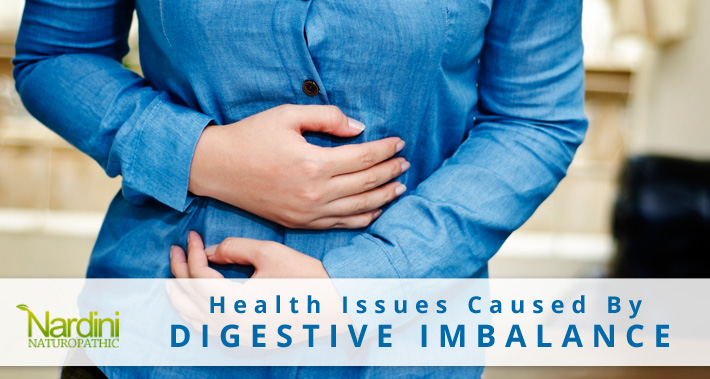Last time we talked about IBS (Irritable Bowel Syndrome), and its link to your thyroid system. But the truth is IBS is only one of many different illnesses that can result from poor digestive health!
Below are some of the most common health issues resulting from poor gut health.
What Is Dysbiosis?
Your digestive system is full of bacteria. In fact, according to the research journal Science, there are about 100,000,000,000,000 bacteria living in our bodies. That’s one hundred trillion! To put that in perspective, if you traveled one hundred trillion miles, you’d make it 16 light years away from Earth, and could vacation on one of the planets orbiting the star Gliese 832.
So, all these bacteria set up shop in your digestive tract in colonies, and compete with each other for space and resources. Normally, there’s a balance between the good and bad bacteria and fungi found in your intestinal tract. But when the bad guys start to overgrow, you can end up with a condition called dysbiosis.
When the bad bacterial colonies grow too large, they release more toxins than usual. When your bacteria are in balance, these toxins are easily managed by your body’s natural waste disposal system. But when your body’s waste disposal system is overburdened during dysbiosis, it can cause damage to your intestinal tract, breaking down the gut barrier and causing toxins to leak into other areas in your body.
From there, you may start experiencing inflammation in other parts of your body, making you more susceptible to autoimmune conditions. Oh, and you may also experience gas, bloating, and diarrhea or constipation.
The best way to discover whether you suffer from dysbiosis is by doing a stool test. From there, we can discover which species of bacteria are out of balance, and put you on the right track toward a healthy digestive system!
What Is IBS (Irritable Bowel Syndrome)?
IBS is a condition which affects your large intestine. It causes your normal intestinal movements to either slow down or speed up, causing either constipation or diarrhea (or both). You may also experience gas, bloating, stomach cramps, and even chronic fatigue.
Some of the big causes of IBS include stress or anxiety, sensitivities or allergies to certain foods, an imbalance of reproductive hormones, and, of course, an imbalance of digestive bacteria.
There is also evidence suggesting the thyroid may play a role as well, especially in conditions like hypothyroidism and a related condition, Wilson’s Temperature Syndrome.
In diagnosing IBS, we first need to rule out other inflammatory bowel conditions, like Crohn’s disease, ulcerative colitis, or Celiac disease.
For more details on IBS, read my previous article on the subject.
RELATED ARTICLE: The Link Between IBS And Your Thyroid
What Is IBD (Inflammatory Bowel Disease)?
IBD isn’t just one disease, but rather a category of several different diseases with similar symptoms and causes. In each disease, though, you’ll experience chronic inflammation of either part of your digestive tract, or of the whole thing.
The most common forms of IBD are Crohn’s disease and ulcerative colitis. The former causes the lining of your digestive tract to be inflamed, and the latter will cause sores to develop in your large intestine, colon, and rectum. For both, severe diarrhea or constipation, weight loss, fatigue, and pain are common.
Another common form of IBD is Celiac disease, which causes an autoimmune reaction after eating any food with gluten in it. This can damage your intestinal lining and prevent your body from absorbing some of the nutrients in your food and impairing the function of your brain, nervous system, liver, bones, and several other vital organs. It can also cause weight loss, bloating, and diarrhea.
Each of these disorders can wreak havoc on your digestive system if not properly treated, and can even be fatal. Diagnosis is usually done by x-ray or colonoscopy.
What Is GERD?
Gastro-Esophageal Reflux Disease, better known as acid reflux disease, is a digestive condition where your stomach acid bubbles up and travels up into your esophagus. It can be caused by stress, and by decreased activity of the vagus nerve, which promotes digestive health. It’s also sometimes associated with ulcers.
Usually this manifests itself in an uncomfortable burning sensation, bubbling, or gurgling in the throat, excessive burping, black stool, and difficulty swallowing food. Certain foods may aggravate GERD, and so may a hiatal hernia.
If you’re suffering from GERD, a dietary change is in order. And you may not like it, but you’ll like the long-term effects of GERD even less!
If left untreated, GERD can cause damage to the esophageal lining which creates all sorts of problems, including an increased risk for esophageal cancer.
Digestive Health Is Optimal Health!
Your digestive system is tightly linked to the rest of your body. And if your digestive system is out of balance, it can affect nearly your entire body! One of the most important steps on your journey toward ideal health is to make sure your digestive system is as healthy as possible.
To discover more about your digestive health, and how a naturopathic doctor can help you, contact me for a FREE 15 minute Health Clarity Session.
Let’s get to the bottom of your health issues, and make this your healthiest year yet!
Until next time, this is Dr. Pat Nardini, ND, putting “Your Wellness First!”
Latest posts by Dr. Pat Nardini, ND (see all)
- How To Repair Your Thyroid Naturally Through Meditation - August 15, 2015
- Health Issues Caused By Poor Digestive Health - April 1, 2015
- Digestive Health Solutions - January 11, 2015













No Comments